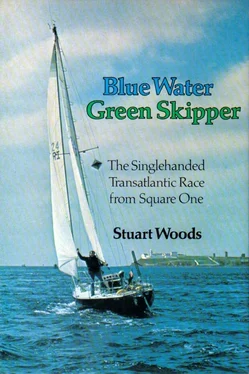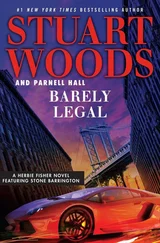I felt, and still feel, a kind of apprehension before beginning a passage — in the earliest days this had been partly a fear of being seasick, or, perhaps, a fear of being frightened, but I was not subject to the kind of demoralizing, even paralyzing fright that I had sometimes seen in others on a boat. Even now, while we were sailing to windward in the biggest winds and heaviest seas I had yet experienced, I felt nothing but excitement and exhilaration. If Archie hadn’t been on deck with me I think I would have been singing or shouting at the top of my lungs into the wind.
Mist bucked into the seas, sending the occasional wave racing down her flush decks to hit us full in the face like a bathtub of water. For some reason, this struck me as funny, and I laughed a lot. I think Archie thought I was hysterical. The two hours of our watch passed very quickly, broken only by the passing of a large, brightly lit ship, probably the Cork — Swansea car ferry, the Inisfallen, which flashed “K” (“I wish to communicate with you”) at us. We had our hands full in this weather, but after looking up what “K” meant, The Kid answered her, with what signal I’m not sure. I think she just wanted to know if we were all right in the heavy seas; it was nice of her to worry.
Below, Irish Mist was, at times, as wet as it was on deck. The main hatch leaked a lot when a wave raked the decks, pouring water into the lower, leeward bunk, rendering it unusable. There was a spacious galley but no handholds, these being judged by Ron Holland as weighing too much, and we had a tendency to ricochet about the main cabin when trying to move around. (When Ron Holland dies and goes to hell, his punishment should be to spend eternity inside one of his own designs with no handholds, sailing to windward in about a Force seven.) If you could stay wedged into a bunk long enough to get the leecloth tied, then you could sleep in reasonable comfort, though. The boat contained the forementioned galley, two lower and two upper berths in the main cabin, a single and a double berth in an after area, and a chart table right aft, where the navigator could, in theory, speak to the helmsman through a small hatch. The rules require certain comforts on a racing yacht, but still it was quite a spartan interior, which Ron thought to be a new high in luxury. (Ron was once quoted by a yachting magazine as saying that all he required for the interior of a racing yacht were facilities for lying down and boiling water. He denies this. I believe the magazine.)
I had a look at the course plotted by The Kid, who was navigating us, and wondered aloud if he were allowing for tidal stream, leeway, and surface drift. He saw no point in bothering with these, and as a result, we ended up twenty degrees below our proper course, had to put in an unnecessary tack, and sailed fifty miles farther than necessary to reach Hugh Town, St. Mary’s, in the Scilly Isles, our first stop.
I was greatly taken with Hugh Town. We were met by the customs/immigration official and advised about anchorages. At one point he asked Archie, “If you’re an Irish ship, why aren’t you flying the Irish ensign?” Archie had a ready and truthful answer.
“My designer thinks flagstaffs weigh too much.”
We visited the local pubs for a few pints and walked through the village, a very pretty one. I resolved to get back here again, maybe single-handed. That would be a good trial for Golden Harp. It was about a twenty-four-hour sail from Crosshaven (on the proper course) over open water, without too much shipping about, and it seemed a very pleasant port in which to spend a couple of days.
We had had a bit of excitement coming into the port, when the gearbox seemed not to be working. When we were ready to drop sails the engine started readily but seemed not to be going into gear. In Hugh Town we discovered that the propeller had fallen off, and Archie decided to sail directly on to Lymington without another stop, since getting in and out of ports would be awkward without the engine.
We weighed anchor early the next morning and began a fast passage, reaching and running down the Channel, sometimes flying a spinnaker. By midnight we were past Start Point and headed for Portland Bill and its infamous tidal race. The Kid, for reasons I never understood, had plotted our course inside the race, saying something about it being on the rhumb line to the Needles. I had long since given up talking with him about the navigation. The Kid was very good indeed on sailing the boat, nearly as good, I think, as he believed himself to be, but I had grown very weary of the patronizing advice he had been constantly giving, and he and I were not getting along very well.
Now we sailed into Lyme Bay with a following wind of about Force three, on The Kid’s course for the inside of the Portland Race. Archie was already worried about going inside and gave Peter Walsh and me explicit instructions not to sail too far out of the bay and, thus, get us into Portland Race. “Don’t get too far in, either,” he had said. “Jibe if you have to, to maintain your course, but for God’s sake don’t get us out into that race. It’s one of the most dangerous places on the south coast of England.”
We sailed on peacefully for a while, and then the wind began to back, and we were having to sail ten degrees above our course to keep from sailing by the lee, that is, with the wind coming from a direction where the boat might accidentally jibe. Soon, we were twenty degrees above our course, and I suggested jibing to Peter. He was doubtful, Archie having given instructions not to sail too far in. Why didn’t we sail on the other jibe for half an hour, then jibe back and sail for another half hour, and so on? Peter finally agreed, though reluctantly. We jibed the boat in the gentle breeze, and Archie was on deck like a panther, in his underwear, roaring about “jibing for the sake of jibing...” I think that, under normal circumstances, he would not have reacted quite the same way, but he was clearly anxious about sailing inside the Portland Race, and he would not listen to any explanation of why we had jibed.
Dawn came and Portland Bill was before us. As the wind had backed it had increased sharply, and was now blowing a Force seven, gusting eight. The seas in the race were huge and close together, with waves breaking everywhere. In addition to the normal problems of negotiating the race, we had wind against tide, and a lot of both. Archie was at the helm, and we had to go within fifty yards of the rocks in order to stay out of the race. It was very exciting sailing, with the boat sometimes reaching ten knots when surfing down the big waves, and we made it safely through. Archie, a former international rugby player, admitted having been scared. “It’s like just before playing for Ireland against England,” he said. “It’s running down your legs.”
After the Portland Race, though, Archie would not let me take the helm again, as a kind of punishment, I think, for my sinful jibe of the night before.
The wind now veered, and as we approached the Lymington River, we faced the prospect of beating up the narrow channel against a falling tide and with the car ferry to the Isle of Wight threatening to leave at any moment. We hailed a couple of smaller yachts, asking for a tow, but nobody could hear us, so we started up the river under sail. This involved a lot of very short tacking, and with a group who had never tacked the boat at all.
In her crew cockpit, Mist has a grinding pedestal linked to the two huge winches, and Pat took charge of that. Peter and I each tailed a winch, and The Kid stood in the pulpit, yelling, “TACK!” whenever he thought we were getting too close to the edge of the channel. It would be very embarrassing to run the beautiful new yacht aground on a falling tide in one of the most densely boat-populated rivers in England. It went well, though, the boat tacking remarkably quickly and accelerating fast. At times she seemed to be pointing straight into the wind. Finally, approaching the marina, a large yacht gave us a tow for a hundred yards or so, and The Kid cast us off with what he thought was enough way on to drift into a berth. He had misjudged, though, and we began to drift backward with the tide, with no steerageway. Pat Donovan had the presence of mind to throw a line to somebody on a berthed boat, just as The Kid panicked and threw the anchor out.
Читать дальше












